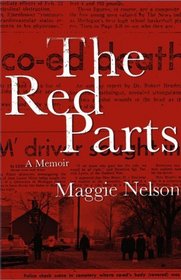Search -
The Red Parts: A Memoir
The Red Parts A Memoir
Author:
One day in March 1969, twenty-three- year-old Jane Mixer was on her way home to tell her parents she was getting married. She had arranged for a ride through the campus bulletin board at the University of Michigan in Ann Arbor, where she was one of a handful of pioneering women students at the law school. Her body was found the following morning... more »
Author:
One day in March 1969, twenty-three- year-old Jane Mixer was on her way home to tell her parents she was getting married. She had arranged for a ride through the campus bulletin board at the University of Michigan in Ann Arbor, where she was one of a handful of pioneering women students at the law school. Her body was found the following morning... more »
ISBN-13: 9781416532033
ISBN-10: 141653203X
Publication Date: 3/13/2007
Pages: 224
Rating: 1
ISBN-10: 141653203X
Publication Date: 3/13/2007
Pages: 224
Rating: 1
4.5 stars, based on 1 rating
Genres:
- Biographies & Memoirs >> General
- Biographies & Memoirs >> True Crime >> Murder & Mayhem
- Biographies & Memoirs >> True Crime >> True Crime




